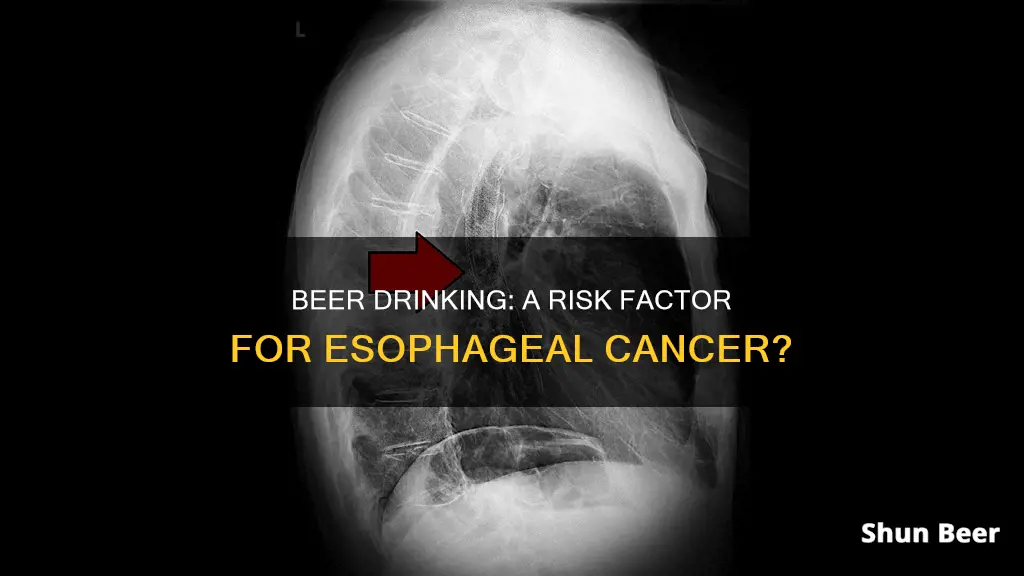
Alcohol is a chemical substance found in many drinks, including beer, and is a major risk factor for esophageal cancer. The more alcohol a person drinks, the higher their risk of developing esophageal cancer. This is because alcohol is metabolised into acetaldehyde, a toxic chemical and probable human carcinogen, which can damage DNA.
The risk of developing esophageal cancer is 1.3 times higher for people who consume one or two drinks per day and 5 times higher for those who consume four or more drinks daily. However, even light drinking, including just one alcoholic drink a day, is associated with an increased risk of esophageal cancer.
The risk of esophageal cancer is also higher among individuals who smoke tobacco and consume alcohol.
| Characteristics | Values |
|---|---|
| Alcohol consumption | The more alcohol a person drinks, the higher their risk of developing esophageal cancer. |
| Alcohol metabolism | Alcohol breaks down into a substance called acetaldehyde, which can irreversibly damage DNA and increase the risk of esophageal cancer. |
| Alcohol type | The risk of esophageal cancer is higher for drinkers of hard liquor, compared to wine or beer. |
| Alcohol cessation | The risk of esophageal cancer decreases years after quitting drinking. |
| Alcohol and tobacco | The harmful effect of smoking and drinking alcohol together is bigger than the sum of their individual effects. |
What You'll Learn
- Alcohol is a chemical substance in alcoholic beverages, such as wine and beer, and is a major risk factor for esophageal cancer
- The liver metabolizes alcohol with the help of an enzyme called alcohol dehydrogenase, which converts alcohol into acetaldehyde, a substance that can cause irreversible damage to a person's DNA
- The risk of developing esophageal cancer is 1.3 times higher for people who consume one or two drinks per day and five times higher for those who consume four or more drinks daily
- The risk of esophageal cancer is also higher among individuals who consume alcohol and have an atypical form of the aldehyde dehydrogenase 2 (ALDH2) enzyme
- Combining smoking with drinking alcohol significantly increases the risk of getting esophageal cancer

Alcohol is a chemical substance in alcoholic beverages, such as wine and beer, and is a major risk factor for esophageal cancer
Alcohol is a chemical substance found in many alcoholic beverages, including wine and beer. Ethanol, or ethyl alcohol, is the chemical name for alcohol, and it is formed by the fermentation of sugars and starches by yeast. The liver metabolises alcohol with the help of an enzyme called alcohol dehydrogenase, which turns it into acetaldehyde.
Acetaldehyde is a toxic chemical and a probable human carcinogen that can cause irreversible damage to DNA. It is highly mutagenic and can form exocyclic DNA adducts. The accumulation of acetaldehyde can cause irreversible damage to a person's DNA, which may result in cancer.
Alcohol consumption is a major risk factor for many types of cancer, including oesophageal cancer, and is responsible for about 6% of all cancers and 4% of cancer deaths in the United States. According to the National Cancer Institute (NCI), alcohol consumption increases the risk of oesophageal squamous cell carcinoma, the most prevalent type of oesophageal cancer. The risk of developing oesophageal cancer is 1.3 times higher for people who consume one or two drinks per day and five times higher for those who consume four or more drinks daily.
The risk of oesophageal cancer is also influenced by other factors, including age, gender, tobacco use, diet, obesity, and certain medical conditions. It is important to note that not everyone who drinks alcohol will develop oesophageal cancer, but the risk increases even at low levels of drinking. Therefore, reducing alcohol consumption can help lower the risk of developing this disease.
Beer and Sinus Infections: Is It Safe to Drink?
You may want to see also

The liver metabolizes alcohol with the help of an enzyme called alcohol dehydrogenase, which converts alcohol into acetaldehyde, a substance that can cause irreversible damage to a person's DNA
Alcohol dehydrogenase (ADH) is an enzyme that facilitates the interconversion between alcohols and aldehydes or ketones. In humans, ADH breaks down alcohols that are otherwise toxic and also aids in the generation of aldehyde, ketone, or alcohol groups during the biosynthesis of various metabolites.
The liver metabolizes alcohol with the help of the ADH enzyme, which converts alcohol into acetaldehyde. This process occurs in the liver, where the ADH enzyme is present at high levels. The enzyme is also present in the lining of the stomach. The conversion of alcohol to acetaldehyde is described by the following chemical reaction:
> CH3CH2OH + NAD+ → CH3CHO + NADH + H+
Acetaldehyde is a toxic substance and its accumulation can cause irreversible damage to a person's DNA. This damage may result in cancer, including esophageal squamous cell carcinoma, which is the most prevalent type of esophageal cancer. The risk of developing esophageal cancer is 1.3 times higher for people who consume one or two drinks per day and 5 times higher for those who consume four or more drinks daily.
The risk of esophageal cancer is also higher among individuals who have a variant form of the ALDH2 gene and consume alcohol. The ALDH2 enzyme normally metabolizes acetaldehyde into non-toxic substances. However, some people, particularly those of East Asian descent, have a variant of the ALDH2 gene that encodes a defective form of the enzyme. As a result, acetaldehyde builds up when they drink alcohol, leading to unpleasant effects such as facial flushing and heart palpitations.
The accumulation of acetaldehyde due to the defective form of the ALDH2 enzyme has been found to substantially increase the risk of esophageal squamous cell carcinoma in individuals who consume alcohol. This increased risk is not observed in people who carry the variant but do not drink alcohol.
Heart Surgery and Diabetes: Can Beer Be Consumed?
You may want to see also

The risk of developing esophageal cancer is 1.3 times higher for people who consume one or two drinks per day and five times higher for those who consume four or more drinks daily
Alcohol is a well-known risk factor for esophageal cancer, particularly esophageal squamous cell carcinoma, which is the most common type of esophageal cancer. The risk of developing this type of cancer increases with the amount of alcohol consumed, with a clear dose-response relationship.
According to research, the risk of developing esophageal cancer is 1.3 times higher for individuals who consume one or two drinks per day and five times higher for those who consume four or more drinks daily. This means that even light or moderate drinking can increase the risk of esophageal cancer. The risk is particularly high among those who consume hard liquors, while a low consumption of only wine may not increase the risk to the same extent.
The mechanism by which alcohol increases the risk of esophageal cancer involves the breakdown of alcohol into a substance called acetaldehyde during metabolism. Acetaldehyde is a toxic chemical that can cause irreversible damage to DNA, increasing the risk of cancer. Additionally, alcohol may act as a solvent for carcinogens, increase cellular membrane permeability, and contribute to nutritional deficiencies, all of which can promote cancer development.
It is important to note that the risk of esophageal cancer is also influenced by other factors, such as tobacco use, diet, obesity, and certain medical conditions. However, combining alcohol consumption with tobacco use significantly increases the risk of esophageal cancer, as tobacco is highly carcinogenic, and alcohol may enhance the absorption of carcinogens. Therefore, it is advisable to drink within, or preferably below, the recommended low-risk drinking guidelines to reduce the risk of esophageal cancer and other alcohol-related health issues.
Beer and Yeast Infections: Is It Safe to Drink?
You may want to see also

The risk of esophageal cancer is also higher among individuals who consume alcohol and have an atypical form of the aldehyde dehydrogenase 2 (ALDH2) enzyme
Alcohol is metabolised by the body with the help of an enzyme called alcohol dehydrogenase (ADH), which converts alcohol into acetaldehyde. Acetaldehyde is then oxidised into acetate by another enzyme, aldehyde dehydrogenase 2 (ALDH2).
ALDH2 deficiency is caused by a variant of the ALDH2 gene, which is particularly common among people of East Asian descent. This variant encodes a defective form of the enzyme, resulting in a build-up of acetaldehyde when alcohol is consumed. This accumulation causes an unpleasant physical reaction known as the alcohol flushing response, which includes facial flushing, heart palpitations, and nausea.
While most people with the ALDH2 variant are unable to consume large amounts of alcohol due to these unpleasant effects, some individuals can develop a tolerance. Those who are able to drink comparable amounts of alcohol to those with the fully active enzyme have been found to have a higher risk of esophageal cancer. This increased risk is not observed in people with the ALDH2 variant who do not drink alcohol.
The alcohol flushing response can be used as a simple and cost-effective way to identify ALDH2-deficient individuals, who can then be counselled to reduce their alcohol consumption. This is particularly important for people of East Asian descent, as they are more likely to have the ALDH2 variant and, therefore, a higher risk of alcohol-related esophageal cancer.
High Blood Pressure and Beer: Is It Safe?
You may want to see also

Combining smoking with drinking alcohol significantly increases the risk of getting esophageal cancer
Alcohol consumption is a major risk factor for esophageal cancer, with the risk increasing alongside the amount of alcohol consumed. However, the combination of smoking and drinking alcohol has a multiplicative effect on the likelihood of developing this type of cancer, which is much greater than using either substance alone.
The Shanghai Cohort Study found that regular drinkers had twice the risk of developing esophageal cancer compared to non-drinkers. Long-term smokers (40+ years) also had twice the risk of developing esophageal cancer compared to non-smokers. When examining the combined effects of smoking and drinking, the study found that the highest risk was observed in those with the highest levels of tobacco and alcohol use. Compared to non-smokers and non-drinkers, those who smoked cigarettes for 40 years or longer and consumed four or more drinks per day had eight times the risk of developing esophageal cancer.
The National Cancer Institute in the United States also reports that moderate to heavy alcohol consumption is associated with higher risks of certain head and neck cancers. Moderate drinkers have 1.8 times the risk of oral cavity and pharynx cancers and 1.4 times the risk of larynx cancers compared to non-drinkers. Heavy drinkers have five times the risk of oral cavity and pharynx cancers and 2.6 times the risk of larynx cancers. The risks of these cancers are substantially higher among those who consume this amount of alcohol and also use tobacco.
Esophageal cancer is not common in the United States, occurring most often in men over 50. There are two main types of esophageal cancer: squamous cell carcinoma and adenocarcinoma. Squamous cell esophageal cancer is strongly linked to smoking and drinking excessive alcohol. Adenocarcinoma is the more common type, and having Barrett's esophagus increases the risk for this type of cancer. Other risk factors for adenocarcinoma include smoking, being male, or being obese.
To reduce the risk of esophageal cancer, it is recommended to limit or abstain from drinking alcoholic beverages. Additionally, it is important to get checked by a doctor if you have severe gastroesophageal reflux disease (GERD) and to get regular check-ups if you have Barrett's esophagus.
Beer, Valsartan, and Amlodipine: Is It Safe to Drink?
You may want to see also
Frequently asked questions
Drinking beer can cause oesophageal cancer. Alcohol is a chemical substance in beer, wines, spirits and other alcoholic beverages. The liver metabolises alcohol into acetaldehyde, a substance that can irreversibly damage DNA, increasing the risk of oesophageal cancer and other types of cancers.
Oesophageal cancer is cancer of the oesophagus, the tube that connects the throat and stomach.
Symptoms of oesophageal cancer include difficulty swallowing, bleeding into the oesophagus, heartburn or acid reflux, and a cough that isn't getting better.







